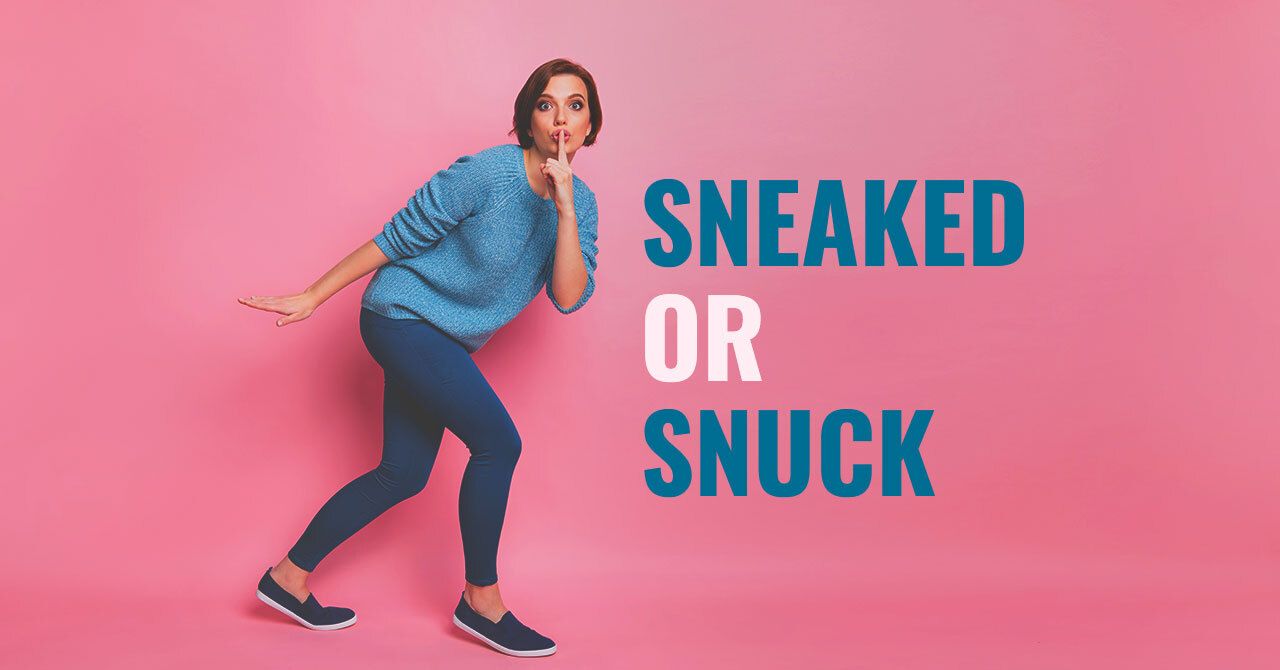
“Sneaked” and “Snuck”—The Difference Lies in Conjugation
Before we move forward to the alternate past tense forms, let’s get this straight. It is “sneak,” not “sneek.”
Irregular verbs are sometimes such a headache. Luckily, there’s a limited number of those verbs, and once you learn them all, you’re good to go. Except there are a few words that sometimes act as regular and sometimes as irregular verbs. Sneak is one of them.
The Meaning and Use of the Verb “Sneak”
You probably already know this word, but just in case… “To sneak” means “to move” (yourself or someone or something else) secretly. Sneaking involves being silent and careful while avoiding getting noticed.
People sneak for various reasons. Thieves sneak to steal someone’s goods. Teenagers sometimes sneak out of their rooms for some special reason. Also, parents often sneak into children’s rooms to act as tooth fairies and replace kids’ teeth with coins or presents. And I’ve just got the idea to sneak into the kitchen and get another ice cream.
Is It “Sneek” or “Sneak”?
Before we move forward to the alternate past tense forms, let’s get this straight. It is “sneak,” not “sneek.” That doesn’t mean that “sneek” is not a word. It is; it’s the name of a city in Europe—the northern Netherlands, to be precise. But now we’re talking about the verb that means to move carefully and quietly while striving to remain unnoticed.
In the present tense, the only correct way to spell that word is “sneak.” But when it comes to the past tense, things become complicated.
What Is the Past Tense of “Sneak”?
The verb “to sneak” is pretty special because it has two conjugations. If we treat it as a regular verb and simply add the suffix -ed, the past tense and past participle forms become: “sneaked.” But it is also possible to use “sneak” as an irregular verb. In that case, both past tense and past participle are “snuck.”
Snuck or Sneaked—Which One to Pick
Sneaked has been the standard past tense form of sneak for centuries. Snuck is also accepted in all variants of the English language. You can hear it in the UK, the US, Canada, Australia, South Africa, and just about every other country in the world where English is spoken.
While both forms are correct, “snuck” is slightly newer and sometimes frowned upon. Because of this tiny detail, it is safer to use “sneaked,” especially if you’re writing an essay or a piece of formal writing. Otherwise, it’s solely a matter of preference.
Examples of “sneaked” in sentences
He waited for everyone to fall asleep and sneaked into the kitchen to get another piece of cake.
I had sneaked into her room and waited patiently until she returned.
She had sneaked outside to take a look at the stars.
An unknown man sneaked into their car and stole the jewelry from their luggage.
This new fashion trend has sneaked its way into the streets of cities around the globe.
They all sneaked into one room and waited for Jill to surprise her.
Examples of “snuck” in sentences
The cat snuck up on the mouse. The poor rodent didn’t stand a chance.
He had snuck a flask of booze into a sober party, and he enjoyed it carelessly throughout the evening.
That night, the two of them snuck out of the house and went to check what had happened.
Most of the rescued puppies impatiently waited to be fed, but some had apparently snuck out of the shelter.
His parents didn’t let him go to the party, so he snuck out and vented anyway.
The pigeon snuck into our home through an open window and made such a mess while we were away.


















